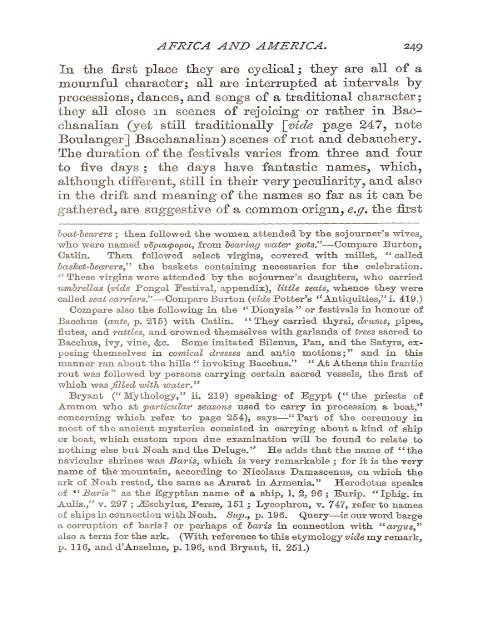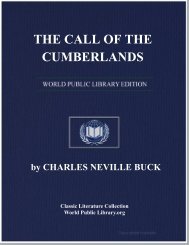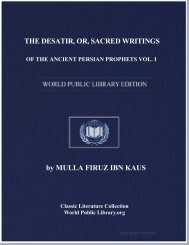- Page 1 and 2:
TRADITION PRINCIPALLY WITH REFERENC
- Page 3 and 4:
World Public Library The World Publ
- Page 5 and 6:
TRADITION PRINCIPALLY WITH REFERENC
- Page 7 and 8:
CONTENTS. CHIP. PAGB PREFACE, . . .
- Page 9 and 10:
X PREFA CE. to estrange the few. am
- Page 11 and 12:
xii PREFA CE. the full application
- Page 13 and 14:
xiv PREFA CE. which have been arriv
- Page 15 and 16:
xvi PREFA CE. With reference to oth
- Page 17 and 18:
MEMOIR OF COLONEL GEORGE MACDONELL,
- Page 19 and 20:
COLONEL GEORGE MACDONELL, C.B. xxi
- Page 21 and 22:
COLONEL GEORGE MACDONELL, C.B. xxii
- Page 23 and 24:
COLONEL GEORGE MACDONELL, C.B. xxv
- Page 25 and 26:
COLONEL GEORGE MACDONELL, CB. xxvii
- Page 27 and 28:
COLONEL GEORGE MACDONELL, C.B. XXIX
- Page 29 and 30:
TRADITION PRINCIPALLY WITH REFERENC
- Page 31 and 32:
THE LA W OF NA TfONS. 3 titled " In
- Page 33 and 34:
THE LA W OF NA TIONS. 5 Victor Emma
- Page 35 and 36:
THE LA W OF NA TIONS. 7 vanquished
- Page 37 and 38:
THE LA W OF NA TIONS. 9 masses of m
- Page 39 and 40:
THE LA W OF NA TIONS. 11 More recen
- Page 41 and 42:
THE LA W OF NA TIONS. 13 outward ex
- Page 43 and 44:
THE LA W OF NA TIONS. i therefore,
- Page 45 and 46:
THE LA W OF NA TIONS. 17 9 is inver
- Page 47 and 48:
THE LA W OF NA TIONS. Here, and in
- Page 49 and 50:
THE LA W OF NA TURE. 21 at the pres
- Page 51 and 52:
THE LA W OF NA TURE. 23 It was, on
- Page 53 and 54:
THE LA W OF NA TURE. 25 " As I shal
- Page 55 and 56:
PRIMITIVE LIFE. . 27 period when fa
- Page 57 and 58:
PRIMITIVE LIFE. 29 where the tribes
- Page 59 and 60:
PRIMITIVE LIFE. 31 would have more
- Page 61 and 62:
PRIMITIVE LIFE. 33 Iroquois and the
- Page 63 and 64:
PRIMITIVE LIFE. 35 I rather than of
- Page 65 and 66:
PRIMITIVE LIFE. 37 If we estimate-t
- Page 67 and 68:
PRIMITIVE LIFE. 39 the traditional
- Page 69 and 70:
PRIMITIVE LIFE. 41 manner, and of t
- Page 71 and 72:
PRIMITIVE LIFE. 43 at the head of e
- Page 73 and 74:
PRIMITIVE LIFE. 45 it the researche
- Page 75 and 76:
PRIMITIVE LIFE. 47 perseded "21 I t
- Page 77 and 78:
PRIMITIVE LIFE. 49 ruptions of thes
- Page 79 and 80:
PRIMITIVE LIFE. 5 r attained to tli
- Page 81 and 82:
PRIMITIVE LIFE. 53 other system. Ma
- Page 83 and 84:
CHAPTER IV. CHRONOLOGY FROM THE POI
- Page 85 and 86:
CHRONOLOGY FROM TRADITION. 57 which
- Page 87 and 88:
CHRONOLOGY FROM TRADITION. 59 first
- Page 89 and 90:
CHRONOLOGY FROM TRADITION. 61 efore
- Page 91 and 92:
CHRONOLOGY FROM TRADITION. 63 the e
- Page 93 and 94:
CHRONOLOGY FROM TRADITION. in Assyr
- Page 95 and 96:
CHRONOLOGY FROM TRADITION. 67 in ea
- Page 97 and 98:
CHRONOLOGY FROM TRADITIO: This t is
- Page 99 and 100:
CHRONOLOGY FROM TRADITION. with its
- Page 101 and 102:
CHRONOLOGY FROM SCIENCE. 73 more th
- Page 103 and 104:
CHRONOLOG Y FROM SCIENCE. 75 accoun
- Page 105 and 106:
CHRONOLOGY FROM SCIENCE. 77 deed, s
- Page 107 and 108:
CHRONOLOGY FROM SCIENCE. 79 first t
- Page 109 and 110:
CHRONOLOGYFROM SCIENCE. 8r present,
- Page 111 and 112:
CHRONOLOGY FROM SCIENCE. ence to th
- Page 113 and 114:
CHRONOLOGY FROM SCIENCE. further fa
- Page 115 and 116:
CHRONOLOGY FROM SCIENCE. or histori
- Page 117 and 118:
CHRONOLOGY FROM SCIENCE. I am very
- Page 119 and 120:
CHRONOLOGY FROM SCIENCE. 91 " If th
- Page 121 and 122:
PALMER ON EGYPTIAN CHRONOLOGY. 93 a
- Page 123 and 124:
PALMER ON EGYPTIAN CHRONOLOGY. 95 -
- Page 125 and 126:
PALMER ON EGYPTIAN CHRONOLOGY. 97 "
- Page 127 and 128:
PALMER ON EGYPTIAN CHRONOLOGY. 99 w
- Page 129 and 130:
PALMER ON EGYPTIAN CHRONOLOGY. 101
- Page 131 and 132:
PALMER ON EGYPTIAN CHRONOLOGY. 03 c
- Page 133 and 134:
CHAPTER VII. THE TRADITION OF THE H
- Page 135 and 136:
THE TRADITION OF THE HUMAN RACE. 10
- Page 137 and 138:
THE TRADITION OF THE HUMAN RACE. 10
- Page 139 and 140:
THE TRADITION OF THE HUMAN RACE. in
- Page 141 and 142:
THE TRADITION OF THE HUMAN RACE. 11
- Page 143 and 144:
THE TRADITION OF THE HUMAN RACE. 11
- Page 145 and 146:
THE TRADITION OF THE HUMAN RACE. 11
- Page 147 and 148:
THE TRADITION OF THE HUMAN RACE. 11
- Page 149 and 150:
THE TRADITION OF THE HUMAN RACE. 12
- Page 151 and 152:
THE TRADITION OF THE HUMAN RACE. 12
- Page 153 and 154:
THE TRADITION OF THE HUMAN RACE. 12
- Page 155 and 156:
THE TRADITION OF THE HUMAN RACE. 12
- Page 157 and 158:
THE TRADITION OF THE HUMAN RACE. 12
- Page 159 and 160:
THE TRADITION OF THE HUMAN RACE. 13
- Page 161 and 162:
THE TRADITION OF THE HUMAN RACE. 13
- Page 163 and 164:
THE TRADITION OF TtfE HUMAN RACE. 1
- Page 165 and 166:
THE TRADITION OF THE HUMAN RACE. 13
- Page 167 and 168:
THE TRADITION OF THE HUMAN RACE. 33
- Page 169 and 170:
THE TRADITION OF THE HUMAN RACE. 14
- Page 171 and 172:
THE TRADITION OF THE HUMAN RACE. 14
- Page 173 and 174:
THE TRADITION OF THE HUMAN RACE. 14
- Page 175 and 176:
THE TRADITION OF THE HUMAN RACE. 14
- Page 177 and 178:
THE TRADITION OF THE HUMAN RACE. 14
- Page 179 and 180:
THE TRADITION OF THE HUMAN RACE. 15
- Page 181 and 182:
THE TRADITION OF THE HUMAN RACE. 15
- Page 183 and 184:
THE TRADITION OF THE HUMAN RACE. 15
- Page 185 and 186:
CHAPTER VIII MYTHOLOGY. SINCE all a
- Page 187 and 188:
MYTHOLOGY. 159 Now, here, I am quit
- Page 189 and 190:
MYTHOLOGY. 161 L'Abbe Gainet, in an
- Page 191 and 192:
MYTHOLOGY. 163 Mr Gladstone (passim
- Page 193 and 194:
MYTHOLOGY. 16 here of all the monot
- Page 195 and 196:
MYTHOLOGY. 167 But such a theory wo
- Page 197 and 198:
MYTHOLOGY. 169 I have already hinte
- Page 199 and 200:
MYTHOLOGY, . 171 find that the lan^
- Page 201 and 202:
MYTHOLOGY. 173 weapon pierced or cl
- Page 203 and 204:
MYTHOLOGY. 175 Twas the morning of
- Page 205 and 206:
MYTHOLOGY. 177 the midst of solar a
- Page 207 and 208:
MYTHOLOGY. 179 a question of absolu
- Page 209 and 210:
MYTHOLOGY. 181 solar theory ? He be
- Page 211 and 212:
"*-*o ASSYRIAN MYTHOLOGY. 183 udden
- Page 213 and 214:
ASS YRIAN MYTHOLOG F. 185 of subord
- Page 215 and 216:
ASSYRIAN MYTHOLOGY. 187 found to su
- Page 217 and 218:
ASSYRIAN MYTHOLOGY. 189 genitor Ada
- Page 219 and 220:
ASSYRIAN MYTHOLOGY. 191 appellation
- Page 221 and 222:
ASSYRIAN MYTHOLOGY. 193 Annacus, Ha
- Page 223 and 224:
ASSYRIAN MYTHOLOGY. 195 don or NeDt
- Page 225 and 226: ASSYRIAN MYTHOLOGY. 197 is said not
- Page 227 and 228: ASSYRIAN MYTHOLOGY. 199 dieted. * N
- Page 229 and 230: ASSYRIAN MYTHOLOGY. 201 < Mast d a
- Page 231 and 232: ASSYRIAN MYTHOLOGY. 203 favourite o
- Page 233 and 234: ASSYRIAN MYTHOLOGY. 205 dinal Vfise
- Page 235 and 236: ASSYRIAN MYTHOLOGY. 207 Of Nebo it
- Page 237 and 238: ASSYRIAN MYTHOLOGY. 209 Noah. It is
- Page 239 and 240: NOAH AND THE DELUGE. 211 20) et il
- Page 241 and 242: NOAH AND THE DELUGE. 213 said more
- Page 243 and 244: NOAH AND THE DELUGE. 215 wine was m
- Page 245 and 246: NOAH AND THE DELUGE. 217 narrated i
- Page 247 and 248: NO A H A ND THE DEL UGE. 219 hea do
- Page 249 and 250: NOAH AND THE DELUGE. 221 founders o
- Page 251 and 252: NOAH AND THE DELUGE. 223 and Deucal
- Page 253 and 254: NOAH AND THE DELUGE. 225 story, tho
- Page 255 and 256: NOAH AND THE DELUGE. 227 definitely
- Page 257 and 258: NOAH AND THE DELUGE. 229 But if the
- Page 259 and 260: NOAH AND THE DELUGE. 231 v current,
- Page 261 and 262: NOAH AND THE DELUGE. 233 dealing wi
- Page 263 and 264: NOAH AND THE DELUGE. 235 at this po
- Page 265 and 266: NOAH AND THE DELUGE. 237 I Bacchus,
- Page 267 and 268: NOAH AND THE DELUGE. 239 He is said
- Page 269 and 270: NOAH AND THE DELUGE. 241 Deucalion,
- Page 271 and 272: DILUVIAN TRADITIONS IN AFRICA, ETC.
- Page 273 and 274: AFRICA AND AMERICA. 245 alf that th
- Page 275: AFRICA AND AMERICA. 247 objects for
- Page 279 and 280: AFRICA A ND A ME RICA. 2 < mild in
- Page 281 and 282: AFRICA AND AMERICA. 253 ary, is no
- Page 283 and 284: AFRICA AND AMERICA. 2;; If we might
- Page 285 and 286: AFRICA AND AMERICA. 257 who serve a
- Page 287 and 288: sacrifice, as it was with such tool
- Page 289 and 290: AFRICA AND AMERICA. 261 ind Jaj B I
- Page 291 and 292: AFRICA AND AMERICA. 263 If, w then.
- Page 293 and 294: AFRICA AND AMERICA. 265 generally (
- Page 295 and 296: AFRICA AND AMERICA. 267 into the co
- Page 297 and 298: AFRICA AND AMERICA. 269 Now, compar
- Page 299 and 300: AFRICA AND AMERICA. 271 representat
- Page 301 and 302: AFRICA AND AMERICA. 273 ceremonial
- Page 303 and 304: AFRICA AND AMERICA 275 APPENDIX TO
- Page 305 and 306: AFRICA AND AMERICA. 277 the Pongol
- Page 307 and 308: AFRICA AND AMERICA. 279 to the peac
- Page 309 and 310: held aloft. Over it, if the family
- Page 311 and 312: CHAPTER XII. S/X JOHN LUBBOCK ON TR
- Page 313 and 314: ON TRADITION. 285 descend from the
- Page 315 and 316: ON TRADITION. 287 AGAINST this view
- Page 317 and 318: ON TRADITION. 2 S9 buck's argument
- Page 319 and 320: ON TRADITION. 291 O ffical or A pal
- Page 321 and 322: ON TRADITION. 293 dispersion, leadi
- Page 323 and 324: ON TRADITION. , 295 pmled as thunde
- Page 325 and 326: ON TRADITION. 297 This ancient roma
- Page 327 and 328:
ON TRADITION. 299 that place the na
- Page 329 and 330:
ON TRADITION. , 301 surprise, as it
- Page 331 and 332:
ON TRADITION. 3°3 (L p. 205), quot
- Page 333 and 334:
ON TRADITION. 305 At p. 468 Sir Joh
- Page 335 and 336:
ON TRADITION. 307 jectured. It may
- Page 337 and 338:
ON TRADITION. fact is. they (the Fe
- Page 339 and 340:
ON TRADITION. 311 ignorant o both o
- Page 341 and 342:
ON TRADITION. 313 civilisation." In
- Page 343 and 344:
ON TRADITION. 315 of the Taliitians
- Page 345 and 346:
ON TRADITION. 317 panion described
- Page 347 and 348:
ON TRADITION. 319 another. . . . Op
- Page 349 and 350:
ON TRADITION. 321 evidence tl they
- Page 351 and 352:
CHAPTER XIII. NOAH AND THE GOLDEN A
- Page 353 and 354:
NOAH AND THE GOLDEN AGE. 325 of the
- Page 355 and 356:
NOAH AND THE GOLDEN AGE. 327 is nee
- Page 357 and 358:
NOAH AND THE GOLDEN AGE. 329 I ask
- Page 359 and 360:
NOAH AND THE GOLDEN AGE. 331 mankin
- Page 361 and 362:
NOAH AND THE GOLDEN AGE. 333 Moreov
- Page 363 and 364:
NOAH AND THE GOLDEN AGE. 335 But he
- Page 365 and 366:
NOAH AND THE GOLDEN AGE. 337 hey we
- Page 367 and 368:
THE LAW OF NATIONS. 339 greater por
- Page 369 and 370:
THE LA W OF NA TIONS. 341 " I. Acce
- Page 371 and 372:
THE LA W OF NA TfONS. 343 * explici
- Page 373 and 374:
THE LA W OF NA TIONS. 345 which the
- Page 375 and 376:
THE LA W OF NA TIONS. 347 Well, all
- Page 377 and 378:
THE LA W OF NA TIONS. 349 being reg
- Page 379 and 380:
THE LA W OF NA TIONS. 351 (2.) That
- Page 381 and 382:
THE LAW OF NATIONS. 353 pure Roman
- Page 383 and 384:
THE LA W OF NA TIONS. 355 miscellan
- Page 385 and 386:
THE LA W OF NA TIONS. 357 quelques
- Page 387 and 388:
THE LA W OF NA TIONS. 359 they had
- Page 389 and 390:
THE LA W OF NA TIONS. 361 acteristi
- Page 391 and 392:
THE LA W OF NA TIONS. 363 Dry will
- Page 393 and 394:
THE LA W OF NA TIONS. 365 quinius o
- Page 395 and 396:
THE LA W OF NA TIONS. 367 possessed
- Page 397 and 398:
THE LA W OF NA TIONS. 369 neque hom
- Page 399 and 400:
IS S THE LA W OF NA TIONS. . 371 m
- Page 401 and 402:
THE LA W OF NA TIONS. 373 seized up
- Page 403 and 404:
THE LA W OF NA TIONS. 375 articles
- Page 405 and 406:
THE LA W OF NA TIONS. 377 " The ver
- Page 407 and 408:
THE LA W OF NA TIONS. 379 I have al
- Page 409 and 410:
THE LA W OF NA TfONS. J 81 this the
- Page 411 and 412:
THE LA W OF NA TIONS. 383 tional li
- Page 413 and 414:
THE LA W OF NA TIONS. 385 remains t
- Page 415 and 416:
THE DECLARATION OF WAR. _ 387 compl
- Page 417 and 418:
THE DECLARA TION OF WAR. 3 yellow,
- Page 419 and 420:
THE DECLARATION OF WAR. 391 demand
- Page 421 and 422:
THE DECLARATION OF WAR. . 393 Compa
- Page 423 and 424:
THE DECLARATION OF WAR. 395 to enfo
- Page 425 and 426:
THE DECLARA TION OF WAR. 397 babili
- Page 427 and 428:
THE DECLARATION OF WAR. 399 before
- Page 429 and 430:
THE DECLARATION OF WAR. _ 401 There
- Page 431 and 432:
; THE DECLARATION OF WAR. 403 to in
- Page 433 and 434:
THE DECLARATION OF WAR. 405 which w
- Page 435 and 436:
THE DECLARATION OF WAR. 407 V its p
- Page 437 and 438:
THE DECLARATION OF WAR. 409 and tha
- Page 439 and 440:
THE DECLARATION OF WAR. 411 to be t
- Page 441 and 442:
THE DECLARATION OF WAR. 413 and for
- Page 443 and 444:
INDEX.
- Page 445 and 446:
4i8 INDEX. 183; II or Ea, 185 ; L'A
- Page 447 and 448:
420 INDEX. 271, 272 ; quoted, 1^^ 2
- Page 449 and 450:
422 INDEX. Flag, the white, a symbo
- Page 451 and 452:
424 INDEX. Japetus, identity of wit
- Page 453 and 454:
426 INDEX. logy, 165, 167-170; on l
- Page 455 and 456:
428 INDEX. Primitive races, 43. 315
- Page 457 and 458:
430 INDEX. Three stages of progress
- Page 459 and 460:
BURNS, GATES & CO.'S LIST. Narrativ
- Page 461 and 462:
BUKNS, DATES & CO.'S LIST. WORKS BY
- Page 463:
The End. World Public Library Assoc

















